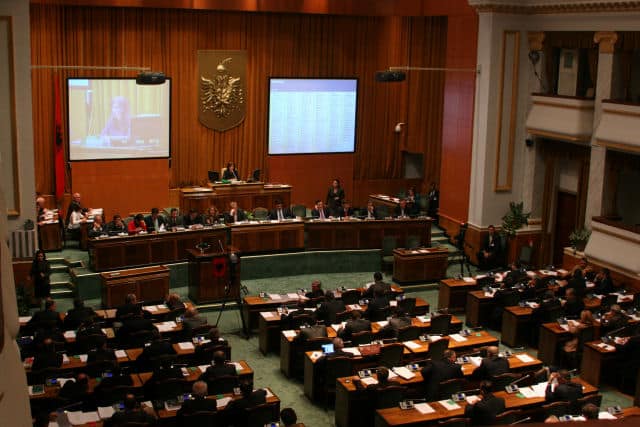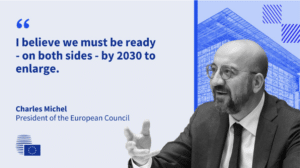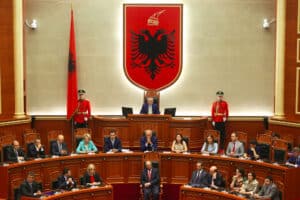On Tuesday 14 January the three main political parties – the Socialist Party (PS), Democratic Party (PD) and Socialist Movement for Integration (LSI) – agreed on the formation of a working group, the so-called “Political Council” to debate electoral reform. The working group has 15 March as a deadline for reaching an agreement. The establishment of the electoral reform working group is applauded by Western partners, as many see it as a significant boost to the country’s chances at opening membership negotiation talks with the EU. The opening of the talks with the EU was blocked in late October by France and the Netherlands, citing the lack of rule of law as the main reason for opposing the start of the accession process with Albania. Many hope that the working group can bring an end to the political deadlock in which Albania finds itself since the start of February.
Protesters called for Electoral Reform
A year ago the PD and LSI resigned their mandates and left the parliament, with only a few MPs remaining. The PD and LSI resigned after a large amount of protests and rallies were held, which were aimed against the government and called for new elections and the formation of a technocratic government.
PD leader Basha has demanded that a new electoral reform law should be the result of consultation with all political parties. This looks to be the case with the creation of the “Political Council”, still some arguments about the composition of the working group continue due to the presence of Socialist Party MP, Damian Gjiknuri, who has been accused of rigging local elections in Diber in 2016. In the past opposition representatives said they would only join electoral reform talks if Gjiknuri resigns. With PD leader Basha claiming multiple times that Gjiknuri should be behind bars, taking part in the “Political Council” thus is a remarkable 180 turn of the opposition.
Victory for the Opposition?
PD Secretary General Gazemend Bardhi released a statement on Facebook, in which she explains why the formation of the working group can be regarded as a victory for the opposition parties. Firstly, she argues that the electoral reform will not be dictated by the government who won the “rigged” elections. Furthermore, decisions on reform will be taken by consensus and outside of the “illegitimate” parliament. Monika Kryemadhi, leader of the LSI, defended the agreement by saying that it was the “ only way” for Albania’s EU integration. Oerd Bylykbashi, opposition representative in the newly established Political Council, said that the electoral reform approval in March needs to be followed by early elections.” In March 2020 the reform process will be closed, the electoral reform issue as one of the conditions for EU accession talks is gone, and the path to early elections is opened; the path is opened immediately after that. There is no other solution not only for the crisis in Albania, but also for our European path.
Elections in turbulent times
New elections would take place in a country which is still recovering from an earthquake in December which left 52 dead. The government faced heavy criticism following the earthquake, with some arguing that the government should have taken more actions, especially since an earthquake on 21 September should have put the government on high alert. Prime Minister Edi Rama called for a 3 month long state of emergency following the earthquake, with western NGOs expressing their concern over a media law which gives the government more authority to impose fines on journalists and media outlets. Besides the internal struggles, Albania experienced a major setback when the opening of accession talks was postponed. North Macedonia, which was in the run to open the talks simultaneously with Albania, immediately called for new elections when the news of the rejection became public. While the government in North Macedonia still has high approval ratings, things look less bright for the government led by Rama. The ongoing protests and recent critique of the handling of the earthquake disaster make it unlikely that the PS will be joining a new government if elections are held in the near future.
Sources: Exit1 Exit2 Exit3 Balkaninsight



